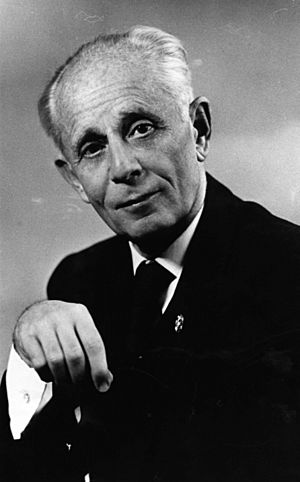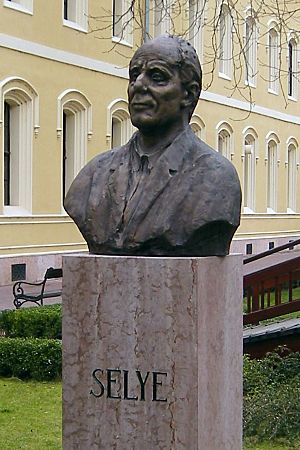Hans Selye facts for kids
Quick facts for kids
Hans Selye
|
|
|---|---|

Selye in the 1970s
|
|
| Born | January 26, 1907 |
| Died | October 16, 1982 (aged 75) Montreal, Quebec, Canada
|
| Other names | Selye János (Hungarian) |
| Scientific career | |
| Influenced | Marshall McLuhan |
János Hugo Bruno "Hans" Selye (born January 26, 1907 – died October 16, 1982) was a very important Hungarian-Canadian scientist. He studied how our bodies react to different kinds of pressure or challenges, which he called "stress." He was one of the first people to show that biological stress is a real thing.
Contents
About Hans Selye
Hans Selye was born in Vienna, Austria-Hungary, on January 26, 1907. He grew up in a town called Komárom. His father was a doctor from Hungary, and his mother was Austrian.
Selye became a doctor and a chemist in Prague in 1929. He then moved to North America to do important work on stress and hormones. He worked at Johns Hopkins University, McGill University, and the Université de Montréal.
He was nominated for the Nobel Prize in Physiology or Medicine many times, starting in 1949. Even though he was nominated 17 times, he never won the prize.
Selye passed away on October 16, 1982, in Montreal, Quebec, Canada. He often visited Hungary and gave talks there. A university in Slovakia, Selye János University, is named after him.
Understanding Stress
Selye became interested in stress when he was in medical school. He noticed that people with different long-term illnesses, like tuberculosis or cancer, often had similar symptoms. He thought these common symptoms were due to what we now call stress.
After finishing his studies, Selye moved to Montreal. He continued his research using lab animals. He saw that rats exposed to things like cold, certain medicines, or surgery showed similar reactions. These things that cause stress are called stressors.
The General Adaptation Syndrome
Selye first called the body's reaction to stressors the "general adaptation syndrome." Later, he simply called it the "stress response." He explained that this response has three main stages:
- Alarm phase: This is the body's first reaction to a stressor. It's like an alert system going off.
- Resistance or adaptation phase: In this stage, the body tries to cope with the stressor and return to normal.
- Exhaustion phase: If the stress continues for too long, the body's resources get used up. This can lead to serious health problems or even death.
Selye found that the body reacts in the same way to any irritating substance. He realized that different diseases could cause similar symptoms because they all put stress on the body. He started using the word "stress" to describe these reactions, and now it's a common word in many languages.
Good Stress and Bad Stress
Selye also taught us that stress isn't always bad. He said that stress is the same whether the cause is positive or negative.
- Distress: This is the negative kind of stress, like when you're worried about a test or dealing with a difficult situation.
- Eustress: This is the positive kind of stress. It can be exciting, like the feeling before a big game or a fun challenge.
Selye also described how the body deals with stress through a system called the hypothalamic-pituitary-adrenal axis (HPA axis).
Sharing His Ideas
Selye wrote many books to share his ideas about stress with doctors and the general public. His book The Stress of Life (1956) became a bestseller around the world. He also wrote Stress without Distress (1974), which helped people understand that not all stress is harmful.
Selye worked as a professor and led a research institute in Montreal. In 1975, he started the International Institute of Stress.
Awards and Recognition
Hans Selye received many honors for his important work:
- In 1968, he was made a Companion of the Order of Canada, which is a very high honor in Canada.
- In 1976, Concordia University gave him the Loyola Medal.
- Also in 1976, he received the Golden Plate Award from the American Academy of Achievement.
See also
 In Spanish: Hans Selye para niños
In Spanish: Hans Selye para niños
- Science and technology in Canada
- Alvin Toffler
 | Stephanie Wilson |
 | Charles Bolden |
 | Ronald McNair |
 | Frederick D. Gregory |


